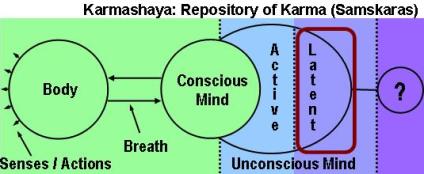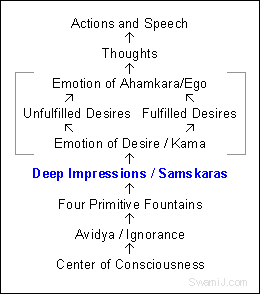Using Yoga to Deal With Those Persistent Samskaras
22 June 2013
The term “Samskara” is a Sanskrit word that literally means “impression” and this essentially refers to an individual’s habitual way of thinking, believing and acting. All actions, enjoyments, sorrows and experiences in general leave their mark in the subconscious and unconscious mind in the form of subtle impressions or residual potencies.
 The ways we tend to act in our relationships and in the world are largely determined by impressions and our past is preserved, to the minutest detail, in the chitta (mind stuff), not the slightest bit is ever lost. The revival of samskaras induces smriti (memory). Memory cannot exist without samskaras.
The ways we tend to act in our relationships and in the world are largely determined by impressions and our past is preserved, to the minutest detail, in the chitta (mind stuff), not the slightest bit is ever lost. The revival of samskaras induces smriti (memory). Memory cannot exist without samskaras.
In most cases our samskaras are based on our personal experiences and/or cultural backgrounds. These impressions (thoughts and beliefs) can also be influenced by the health of our brain chemistry. For example, when we suffer from depression or anxiety, our beliefs about what is possible or impossible for us will be clouded, a sense of hopelessness and powerlessness may predominate as a result of low levels of serotonin and dopamine.
The internal freedom for self-realization that regular yoga practice offers is founded on the ability to reveal and bring to conscious attention our thought patterns, beliefs and the actions that arise from those samskaras. Yogic breathing techniques and asana (postures) are very effective tools for easing anxiety, depression and balancing neurotransmitter signals in the brain. With a bit of patience and a committed yoga practice, a yoga student will be able to quickly identify the samskaras and resulting actions that continue to undermine their ability to be physically, mentally and emotionally healthy.
Whenever a yoga practitioner identifies (or recognizes) their obscure and/or inhibiting samskaras, they will then be free to choose more life enhancing alternatives. All too often, we limit our own potential by assuming that we are not capable or skilled enough to create the life we dream of. Although some of these self-limiting thoughts may have some degree of truth to them, our ability to achieve the goals we’ve set is often far greater than we may ever imagined. When we start to gently direct our thinking along more positive lines, we will begin to truly realize that more is possible in our lives, and this will prompt us to act accordingly.
Understanding the concept of samskaras will be of great value when it comes to practicing “witnessing” of the various thoughts and emotions that inevitably arise during asana practice. According to traditional yogic philosophy, the most direct way to internal freedom is to witness these samskaras from a place of deep self-compassion and without unnecessarily identifying with them.
When unpleasant or painful emotions and restricting thoughts arise during a yoga session, strive to be more consciously aware, so that the credibility of you samskaras can be evaluated objectively. If there are negative thoughts or beliefs that are valid, some personal changes may be called for. For example; suppose you are a law student and you’ve failed the bar exam twice due to being unprepared, then studying harder for the exam would be in order.
However, on the other hand, subscribing to the belief that you’re is inherently too unintelligent to pass the bar, even after getting your degree from law school is clearly unrealistic. As in most cases, this sort of limiting samskara is best invalidated in the light of your self-compassion, and then substituted with a more encouraging and accurate assessment of your own intelligence.